- About Us
- Columns
- Letters
- Cartoons
- The Udder Limits
- Archives
- Ezy Reading Archive
- 2024 Cud Archives
- 2023 Cud Archives
- 2022 Cud Archives
- 2021 Cud Archives
- 2020 Cud Archives
- 2015-2019
- 2010-2014
- 2004-2009
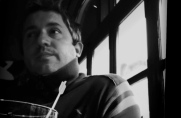 |
Ezy Reading: |
This October, indie rock act There Is No Sin will be releasing their second album, ‘We Are Revealed’. Recently, The Cud sat down with the band’s singer-songwriter, Troy Keiper, to talk new music, of being a band in Portland, Maine, and the logistics of organizing an overseas tour.
THE CUD: Back in 2009, the band’s debut was released as ‘There Is No Sin In My Body’ and limited to just 500 copies that sold out in two months. With that kind of positive reaction, does it make the process of a follow-up album much different? Obviously the same work ethic and enthusiasm will be there, but I guess I wonder how much the pressures of outside expectations can nag to the point that they start to exceed or intrude upon your own?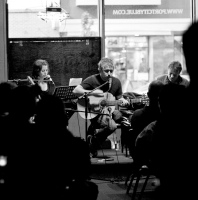
TROY: During production, I’d sometimes think “so and so asked for a happy song" or "why are these three songs all the same tempo?” That’s when I’d hear the ghosts of listeners past, long after I’d written them.
The eleven songs that made it onto the new record were the survivors. I culled them from maybe 30 to 40 demos. I don’t sit down and write songs. They fall out of me quickly. Some are fine. Some are awful. I always expect them to fit a story arc but other than that, no real expectations.
THE CUD: To that end, was the actual writing and recording of ‘We Are Revealed’ quite a short process working to deadline, or did you have flexibility and plenty of access to studio time? (The album was recorded at Busted Barn Studio in Portland, Maine) What does producer and musical collaborator Pete Morse bring to a project?
TROY: Since the writing was done long before the studio, I spent most of my time assembling them leading up to recording deciding what to use. I recorded the first CD myself over the span of a year, so this was a really different experience. The recording took two months and the production took about two more. It was definitely more structured.
Pete is very methodical. He’s a great guitarist too. His ear for production is fascinating. At one point, a friend of mine was going to come by and record some harmonies. When he couldn’t make it, I said, “Hey Pete, can you sing?” He went into the vocal booth and I was laughing when he came out: “Why didn’t you tell me before?” 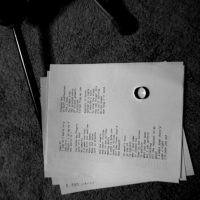
THE CUD: There’s a very stripped down, almost sparse feel to the album that gives it a very ethereal, haunting quality. As someone whose roots lie firmly in punk rock, do you find it’s sometimes a fight to soften and scale things back? I suppose true punk rock is pretty stripped down and sparse anyway, right?…
TROY: Yeah, Jim Jarmusch once said that the Sex Pistols and the Ramones were important because they stripped things down. If you take my songs and play them double-time, they’re all punk songs. Three, four chords mostly. On some tracks, I don’t even have bridges.
A lot of the stuff I grew up with—Joy Division, R.L. Burnside, Dead Kennedys, house music--has this cyclical feel to it. I like taking these simple chords and letting them revolve around with slight deviations. I’ll even take chord progressions and carry them over into the next song. I’m more interested in the words and the mood than the musicianship. Besides, Tool already did that far better than I could.
THE CUD: What have you chosen as the first single for the album?
TROY: “Practice Crawling” got the nod even though videos for two other songs were released earlier. Some of my friends on Twitter liked it when it previewed on a website so I ran with it. I use a lot of extensive market research. (laughing)
A filmmaker named Rukshan Thenuwara is working on a video for that song. It’s based around this idea that I had where it documents the day in the life of an office worker who just happens to be a monkey.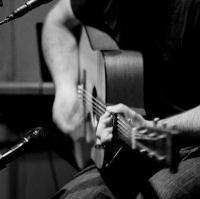
THE CUD: Speaking earlier of those ‘outside expectations’, while the band are based in Portland, Maine, it’s fair to say that the bulk of your fan base are overseas- primarily in France, right? Is this a testament to the impact of the Internet and social media in shrinking the globe, or something that you think may have more to do with the specific nature and appeal of your music? I almost hesitate to ask, ‘is it just that Europeans ‘get you’ better than U.S audiences?’ I imagine that’s oversimplifying (or overcomplicating?) things…
TROY: The first disc wasn’t marketed at all. A few reviewers got copies but it wasn’t available in stores. Every sale came from the web. I did two things that most musicians don’t do: I posted the CD for free in the newsgroups and on BitTorrent. I wanted people to find the music. I wasn’t looking to make money from it.
Unlike a lot of acts, I wasn’t interested in performing live. I felt like I’d done that earlier in my life. I played a few shows but it isn’t “rock” and it isn’t “singer/songwriter.” There aren’t many U.S. venues for what’s basically acoustic emo.
Most of the CDs went to the UK and Europe. It seems to have been word of mouth. We’re headed there in October to perform for the first time, so I’ll let you know if it’s that they “get me.” I kind of hope that’s all it is. I’d be an expat in a heartbeat.
THE CUD: Portland has a thriving music scene, but I get the impression that the city has been told several times over the past 20 years that they were just on the cusp of becoming ‘the next Seattle’ ‘the next Austin’, etc… What’s your take on music in Portland, and where does There Is No Sin fit into that music community, especially when, as you said, so many of your fans are based overseas?
TROY: It’s basically a tiny brother to Boston. The scene in Boston is so much larger and well-established, that Portland bands will always want to head south. Maine’s had a number of artists that have broken out. Ray Lamontagne is probably the most successful, at least currently.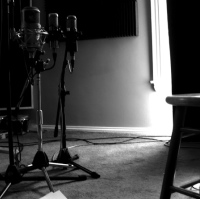
When I moved here in ’96, after coming from New York, it was a bit of a letdown. I was spoiled though. If we were wandering around at 11PM, in the mood for some dub step, we could probably find it. Here, the population is too small for it to be the next “Seattle” or “Austin.” You need more bodies to keep a lot of diverse clubs afloat.
THE CUD: The finished CD is actually accompanied by a 50-page book that contains more than just lyrics and liner notes, it features a short story about a couple spending time together ‘away from home’. Could you talk a little about that?
TROY: I always loved the scale of LPs. It was such a big canvas. It’s the one thing about digital releases that kills me. I’m always thinking of the music as part of a larger structure and pulling MP3s out of the air doesn’t give you the same vibe.
The CD from 2009 came with a booklet. It snowballed from that. My first thought was to package the CDs inside of recycled books but I started thinking, “what if I just created one for it?” The writing was easy but the editing was painful as hell. And dealing with printers and the like…I almost bailed on the concept.
The short story is allegorical. My lyrics are collages so it was easy to draw parallels with the rise and fall of a relationship. The lines in my songs, say something like “you made enough smoke to be poor,” depict scenes that I don’t elaborate on and the book was just one more way for me to be obtuse. (laughs)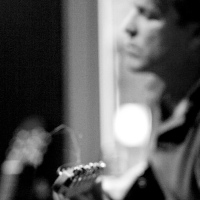
THE CUD: Inside the book are several photographs by the French artist Christophe Garnier. Was this a collaboration the two of you had discussed in the past? How did you come to work together?
TROY: Christophe found me, actually. We started talking through Twitter after he picked up the first CD. Somehow the idea came up last year and he sent me some ideas. He had a series of beach photos that were beautifully composed in black and white. They felt profound. I loved them.
THE CUD: By the time this issue goes live you’ll have already played a number of gigs in New York and New England in support of the album, and be embarking on a series of dates in the U.K and France. Could you share a little of the logistics of trying to organize an overseas tour? I suppose it can’t hurt that you’re fluent in French…
TROY: (laughing) My French is awful. I’ve been trying though. I seem to pick it up quickly enough but when I go off the tracks, I go way off the tracks. People like Christophe seem to tolerate me experimenting with their language.
The hardest part about heading across the Atlantic has been getting everyone there. I’m used to fending for myself. Getting the other musicians over there was tougher. The venues have been wonderful though. We keep adding shows.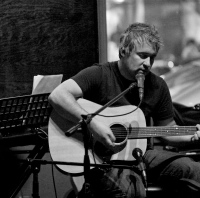
THE CUD: Do you have any uniquely personal quirks, superstitions or habits while on tour that make you just as eccentric as just about every other musician I’ve ever met? Some practice scales, some can’t talk to anyone before going onstage due to nerves, while others need a specific drink.
TROY: When I was a kid, I used to get my friends to setup my equipment for me. Not because of any superstition. I didn’t want to get on stage until we were playing. It just seemed more dramatic (and hilarious too, since we were playing these tiny clubs).
THE CUD: I recently spoke with a guitarist in Australia who said he had a twenty-two hand-pat ‘touch checklist’ on his guitar that he had to go through before each and every show or else he wouldn’t be mentally at ease enough to play well. I was gutted that he’d never heard of Nomar Garciaparra...
TROY: Baseballs players are the worst for that stuff. I wonder if they’re more prone to OCD.
I’d do better on stage if I developed a few habits. It takes an incredible amount of effort for me to stay focused during a show. That’s why I don’t drink until afterwards. I’ve whacked my head on too many things in life. My memory is shot. If I downed a few pints first, I’d be up there making up new lyrics.
‘We Are Revealed’ will be available this October through Clip Records. Visit the official band site at: www.thereisnosininmybody.com/
All photos copyright Troy Keiper/Jessica Verry
